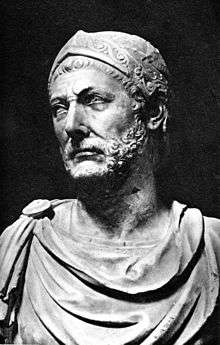Hasdrubal the Boetharch
Hasdrubal the Boetharch was a Carthaginian general during the Third Punic War. Little is known about him. Boetharch is a Carthaginian office, the exact function of which is unclear, and is not to be confused with the Greek Boeotarch.
Hasdrubal led the Carthaginian forces at the Siege of Carthage in 146 BC. Their defeat by Scipio Aemilianus, a consul of the Roman Republic, brought the war to a close. Hasdrubal's military skill was not to be doubted, as his army had been well trained and equipped. His work at defending Carthage cost the Romans a difficult campaign to suppress the defenders. His tactical skills, however, were dwarfed by his contemporaries Masinissa and Scipio.
Hasdrubal had a wife and two sons, who, according to Polybius, threw themselves into a burning temple when they witnessed their army's defeat. Hasdrubal had surrendered himself to the Romans prior to his family's deaths, an act possibly provoking their suicide. He was taken to Rome and displayed during Scipio's triumph, but later allowed to live in peace in Italy.[1]
This may be the same general Hasdrubal who was defeated near the town of Tunes (now Tunis) by the Numidian king, Masinissa, just after war was declared (149 BC).
References
- ↑ Mommsen, p. 54
Smith, p.360
- H. L. Havell, "Republican Rome: Her Conquests Manners and Institutions from the Earliest times to the Death of Caesar", BiblioBazaar, 2009, ISBN 1-115-39574-2, p. 321
- Theodor Mommsen (trans. William Purdie Dickson) The history of Rome, Volume 3, pp. 42–54, C. Scribner & company, 1870
- Book XXXVIII of Polybius' Histories, English Translation, 7-8,20
- William Smith, Dictionary of Greek and Roman biography and mythology, Volume 2, pp. 359–360, C.C. Little and J. Brown, 1849
External links
- Polybius, Fragments of Book XXXVIII, 7
- Livius.org: Hasdrubal
- William Smith, "Dictionary of Greek and Roman biography and mythology, Volume 2", C.C. Little and J. Brown, 1849 .

